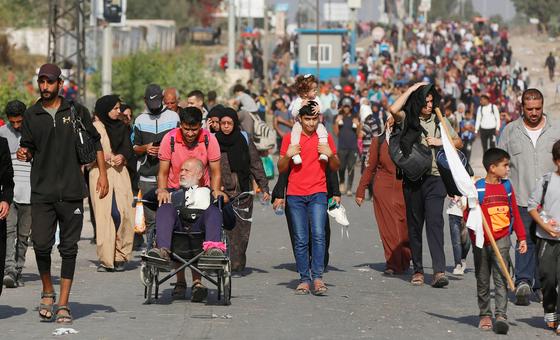Speaking at the annual World Economic Forum in Davos, Switzerland, the UN chief condemned the “barbaric” Hamas-led attacks on 7 October in which approximately 1,200 people were butchered in southern Israel and some 250 taken as hostages.
And amid reports of ongoing heavy Israeli bombardment which has left tens of thousands of civilians dead and prompted repeated warnings from UN humanitarians of approaching famine and disease among the 1.9 million people displaced, Mr. Guterres said “spillover” from the conflict in the wider region was “already taking place”.
Conflict already widening
A fully-fledged confrontation between Israel and Lebanon where rocket and weapons exchanges on the border with Israel have already claimed lives “would be a total disaster”, the UN Secretary-General insisted.
Any escalation “needed to be avoided at all costs”, he said, just as attacks by Houthi fighters in Yemen on ships in the Red Sea had demonstrated that all efforts to date to resolve the Gaza crisis were “not enough”.
“It’s very important to address the humanitarian situation in Gaza, it’s very important to have a humanitarian ceasefire…but we need to find once and for all a total commitment of the international community for a two-State solution to exist in Israel and Palestine as the basis for a stable and peaceful Middle East for the benefit of everybody,” he said.
Territorial integrity key
The only way for Israelis and Palestinians to live together in security “is if each one of them has a State”, the UN Secretary-General explained, expanding on his earlier remarks about the importance of respecting countries’ territorial integrity, in particular Ukraine’s, nearly two years after the full-scale Russian invasion.
“From Russia’s invasion of Ukraine, to Sudan, and, more recently, Gaza, parties to conflict are ignoring international law, trampling on the Geneva Conventions and even violating the United Nations Charter,” Mr. Guterres said, before noting that geopolitical divisions had become a major threat to the “faltering” global economy.
In a call to world leaders and the private sector to prevent further damage to governmental trust and the institutions that form the bedrock of global cooperation, the UN Secretary-General urged them to back reforms of financial institutions “to get the world back on track to safety, prosperity and peace”.
‘Hellbent’ on global warming
Many of the world’s ills were the result of a disconnect between “the rich, the big and the rest of the world”, he told the world’s economic elite, in an appeal for a “serious negotiation” between industrialised nations and emerging economies that were “drowning in debt”.
Countries in the Global South were so crippled by high interest rates that they were unable to future-proof their citizens when implementing the Sustainable Development Goals (SDGs) had never been more important, Mr. Guterres insisted, just many countries remained “hellbent” on raising emissions of greenhouse gases.
“The fossil fuel industry has just launched yet another multi-million-dollar campaign to kneecap progress and keep the oil and gas flowing indefinitely,” the UN chief said, in a wide-ranging address highlighting how many nations seemed “powerless to work together” to stop the climate threat, while in Switzerland “glaciers are disappearing before our eyes”.

